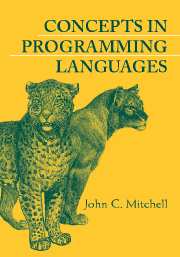
-
Select format
-
- Publisher:
- Cambridge University Press
- Publication date:
- 05 June 2012
- 14 October 2002
- ISBN:
- 9780511804175
- 9780521780988
- Dimensions:
- (253 x 177 mm)
- Weight & Pages:
- 1.126kg, 540 Pages
- Dimensions:
- Weight & Pages:
You may already have access via personal or institutional login
Book description
For undergraduate and beginning graduate students, this textbook explains and examines the central concepts used in modern programming languages, such as functions, types, memory management, and control. The book is unique in its comprehensive presentation and comparison of major object-oriented programming languages. Separate chapters examine the history of objects, Simula and Smalltalk, and the prominent languages C++ and Java. The author presents foundational topics, such as lambda calculus and denotational semantics, in an easy-to-read, informal style, focusing on the main insights provided by these theories. Advanced topics include concurrency, concurrent object-oriented programming, program components, and inter-language interoperability. A chapter on logic programming illustrates the importance of specialized programming methods for certain kinds of problems. This book will give the reader a better understanding of the issues and tradeoffs that arise in programming language design, and a better appreciation of the advantages and pitfalls of the programming languages they use.
Reviews
‘… an extremely rich source of important information, subtle issues, and diverse and challenging exercises … the book is interesting, challenging and a pleasure to read.’
Source: JFP
Contents
Metrics
Altmetric attention score
Full text views
Full text views help Loading metrics...
Loading metrics...
* Views captured on Cambridge Core between #date#. This data will be updated every 24 hours.
Usage data cannot currently be displayed.
Accessibility standard: Unknown
Why this information is here
This section outlines the accessibility features of this content - including support for screen readers, full keyboard navigation and high-contrast display options. This may not be relevant for you.
Accessibility Information
Accessibility compliance for the PDF of this book is currently unknown and may be updated in the future.


